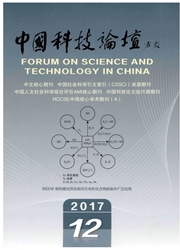

 中文摘要:
中文摘要:
根据企业技术创新过程,将政府的激励政策分为6种,采用静态与动态博弈相结合的方法.探讨政府激励政策对企业技术创新的作用机制。研究表明:政府的直接补贴和税费返还可提高企业的技术创新水平,但会造成社会成本的浪费,损害社会福利;政府购买与产学研合作可促进社会福利的最大化,但产学研合作中企业的利润增量明显小于政府购买下的利润增量;政府的知识产权保护+固定权利金授权、政府的知识产权保护+单位权利金授权不但可以实现企业技术创新水平的最优,而且可以实现社会资源的帕累托最优;政府的知识产权保护+单位权利金授权可使大企业所得的均衡利润大于采用固定权利金授权方式所得的均衡利润,而政府的知识产权保护+固定权利金授权可使小企业的均衡收益大于采用单位权利金授权方式所得的利润。
 英文摘要:
英文摘要:
Based on the classic "Clever Pig Game" model, it divided government incentives on enterprise technology innovation into six kinds according to process of technological innovation. Adopting the method of combining static and dynamic game, the mechanism of government incentives for technological innovation is explored. The study shows that the direct government subsidies and tax return can increase the level of technological innovation of enterprises, but it will result in the waste of social costs and harming social welfare. Secondly, the government purchasing and industry-university-research institute cooperation can promote social welfare, but the incremental profit of the enterprise in the latter is significantly less than the incremental profits under government purchases. Again, preferential financing policies, "the government's protection of intellectual property rights gold + Fixed authorization", "the government's protection of intellectual property rights gold + units authorized" can not only achieve the optimal level of technological innovation, but also can achieve Pareto optimal. Finally, the equilibrium profit of large enterprises under "the government's protection of intellectual property rights gold + units authorized" is greater than that of the premium fixed income equalization license prof- its. While the equilibrium profit of small enterprises under "the government's protection of intellectual property rights gold + Fixed au-thorization" is greater than that of unit royalty license profits.
 同期刊论文项目
同期刊论文项目
 同项目期刊论文
同项目期刊论文
 期刊信息
期刊信息
